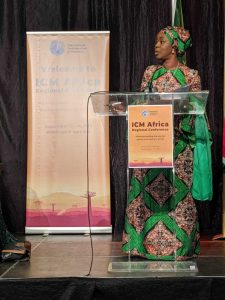Categories
Thank you to the Independent Midwives Association of Namibia and the ICM Board Members for the Africa region, who as our hosts have accorded us the warmest welcome here in Namibia.
I am delighted to offer my own welcome to you all, as ICM’s inaugural Global Goodwill Ambassador, to the Africa Regional Conference of the International Confederation of Midwives (ICM).
I would like to pay tribute to the work done by my dear friends Sally and Franka, at the leadership of level of ICM, who along with their team, work tirelessly with and for midwives all around the world.
In fact, the numbers increase every time I give a speech for ICM. I believe that ICM now supports and represents an incredible 140 Members Associations, representing 121 countries. Thank you for all that you do, and for bringing us here together, with the support of generous partners and sponsors.
Most of all, of course, welcome and thank you to our midwives. It is a real pleasure to see many familiar faces here today, and I look forward to meeting more of you over the duration of this conference.
The theme here today, ‘midwives leading the way for quality and equity in Africa,’ is striking in its simplicity and accuracy. As we share our experiences and knowledge here in Namibia,
I know that we will focus on how midwives already lead the way across Africa in so many different respects. I look forward to strategizing how we overcome barriers that prevent midwives from providing the very best of care to women, newborns, families and communities wherever they may be – from a small village in Namibia to the bustling streets of Lagos.
 I have always operated according to the central belief that a women-centred, midwife-led model of care – one that follows normal physiologic labour and childbirth with no unnecessary or excessive interventions – saves lives and allows women and their infants to stay alive and thrive. That is, of course, essential. But midwife-led care is also transformative beyond the labour room.
I have always operated according to the central belief that a women-centred, midwife-led model of care – one that follows normal physiologic labour and childbirth with no unnecessary or excessive interventions – saves lives and allows women and their infants to stay alive and thrive. That is, of course, essential. But midwife-led care is also transformative beyond the labour room.
At the World Health Assembly in Geneva earlier this year, I welcomed the launch of the report ‘Strengthening quality midwifery education for Universal Health Coverage 2030: A transformative approach to improving quality of care,’ produced by ICM, alongside WHO, UNFPA and UNICEF.
Wherever they work, midwives are the community leaders and interlocutors who are best placed to advocate for and ensure safe environments including, but also beyond, pregnancy, birth and breastfeeding. In many instances rural midwives represent the sole point of access to health care in remote and under-served areas. When midwives are safe and able to carry out their full range of services, we will have a real opportunity to drive forward Universal Health Coverage.
That means providing whole-system support for midwives, including the adequate tools, equipment, and medicine to provide the full scope of timely, high-quality care; and the capacity to carry out the WHO-recommended 8 antenatal visits.
That can only be achieved through effective supply chain management and procurement. By that I mean we must overcome challenges related to drug selection, registration, quantification, procurement, storage and distribution, quality assurance, and information systems.
Where midwives’ human resources metrics are not tracked, they cannot be managed. Thus, more data on midwives is needed: from midwifery schools on graduate profiles; to professional associations on licensure, registration, and continuing professional development. We need routine, robust, and up-to-date human resource information systems.
Midwife-generated data streams can provide valuable feedback on how services are delivered. With accurate information we can advocate for service improvements. A comprehensive civil registration and vital statistics system must form the foundation of health services and personnel decision making. Metrics provide the evidence needed to understand and advocate for how midwives’ enhanced leadership roles can optimize health systems.
We also know, and demand that a midwife’s workplace must be free from sexual harassment and gender discrimination. This as an absolute essential element of a functioning, decent and dignified health system. According to a global survey conducted by the ICM and the WHO, 37% of midwives reported that they have experienced harassment at work, whether from colleagues or patients. Effective interprofessional collaboration is important to keeping midwives’ workplaces safe. Midwifery must have its own ‘MeToo’ moment – and the harassment must end. Respect for both Midwives and their work in maternity care is a non-negotiable necessity.
At the Wellbeing Foundation Africa, of which I am the Founder-President, I have seen the remarkable effect that midwifery-led care has on equity in relationships and communities. Our ‘MamaCare’ midwives deliver their antenatal classes to women, but are also counsellors on issues as diverse as domestic violence and financial access. Men may attend some classes, and I have seen them sit quietly at the back of the room taking notes. Quite right too. I know that this is an experience mirrored by midwives across Africa, who act as strong role models and champions for women.
I am delighted to be here with you all in Namibia and I look forward to our shared learning and growth. Next year the Year of the Nurse and Midwife will be upon us. The Africa Regional Conference is going to be an important event for midwifery, it is an opportunity for us to lay the groundwork to drive progress forward. It is a space that allows us not only to share the latest developments in midwifery knowledge but also to build new partnerships that strengthen our networks within the region. A space we can exchange learning experiences and professional realities, and work together on solutions to the challenges we must overcome.
Thank you.
Categories